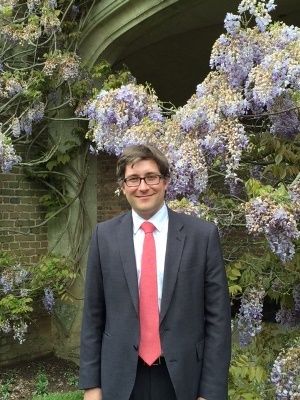
When Professor Nicolas Lamp took on the role of Academic Director of the Bader International Study Centre’s Global Law Programs this year, he knew that input from former Herstmonceux Castle students would be essential to building on the successes of previous years and further improving the experience for future generations.
He comes to the role with impressive experience of his own. Prior to joining Queen’s Law, Lamp worked as a Dispute Settlement Lawyer at the World Trade Organization and earned his PhD in Law at the London School of Economics and Political Science in 2013, completing a doctoral thesis entitled “Lawmaking in the Multilateral Trading System.”
As an instructor, and now as Academic Director, Lamp understands the value of the Global Law Programs at the Queen’s-owned BISC in East Sussex, U.K., for Canadian law students.
“As I see it, the castle program has three unique strengths,” says Lamp. “First, students are able to get a sense of the whole international legal field, providing the foundation for educating a group of first-rate international lawyers at Queen’s. Second, students are exposed to teachers and speakers who have a great wealth of practical experience in their fields. And third, students are encouraged to imagine themselves working in the international field and learn how one can have a career as an international lawyer.”
With a view to improving on these strengths, Lamp aims to make the castle courses more complementary to those offered at Queen’s Law so students are able to deepen their studies in specialized areas of international law when they return home. He will also work with instructors and administration to strengthen the practical dimension of castle teaching.
His goals are to facilitate a better integration between teaching and field trips and to oversee a gradual shift from an exam-based evaluation to one that is more dynamic, practical and closer to that required of international lawyers in practice. “We will attempt to match the field trip visits more closely with material covered in the courses, ensuring that instructors know in advance what the trips will cover so they can engage students with these materials in class,” he says. “We are also going to move away from exams as the exclusive method of evaluation, and instead, introduce in-class participation elements, graded moots or short essays/case comments.”
Not everything will change however. Lamp plans to continue the “Career Options Evening” event and to further strengthen the existing internships often extended to students through connections made with their instructors. One of the greatest benefits of the BISC program for law students is the direct contact students have with practitioners as their instructors and through the field trip visits.
“I look forward to working with the instructors and to meeting the new students this year and in the coming years,” Lamp says, “and to hearing their suggestions and feedback as we work to implement these new ideas.”
Learn more about the BISC and the Global Law Programs.